Case Study Analysis: Exploring the Role of MCH Nurse in Child Health
VerifiedAdded on 2021/04/19
|12
|1657
|66
Case Study
AI Summary
This case study examines the critical role of Maternal and Child Health (MCH) nurses in supporting families and children. It outlines the core functions of MCH nurses, including developmental assessments, health monitoring, and providing support for postpartum depression. The case study follows a father bringing his four-year-old child for their first MCH visit, detailing the importance of developmental milestones and the interventions provided at various stages up to four years of age. It emphasizes the benefits of MCH services, such as addressing challenges related to breastfeeding, sleep, and immunization, while also highlighting the role of MCH nurses in ensuring optimal health outcomes and addressing any abnormalities in child development. The study concludes by emphasizing the necessity of MCH services for children and families, facilitated by the MCH nurse, and providing a comprehensive overview of the services available.
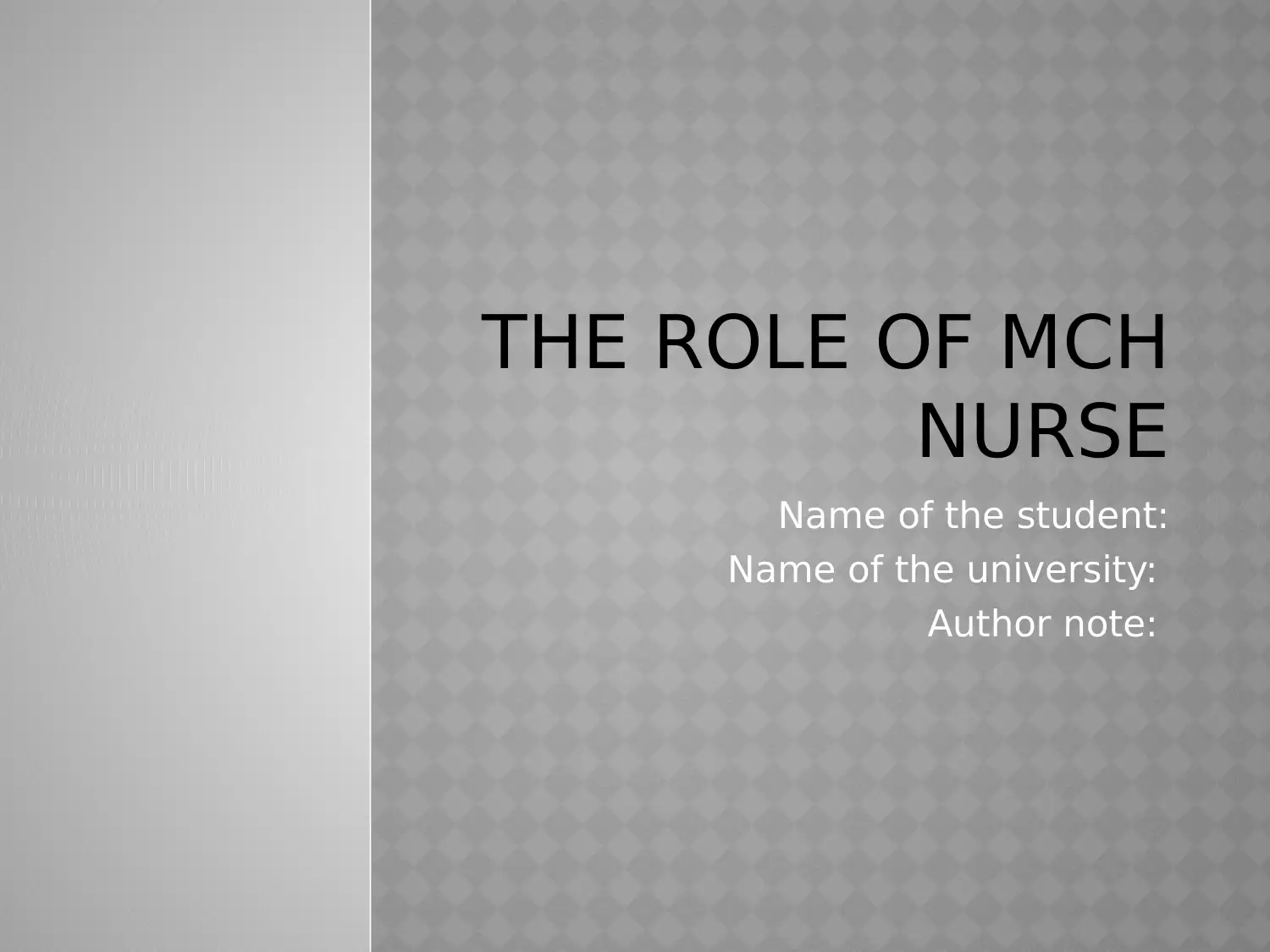
THE ROLE OF MCH
NURSE
Name of the student:
Name of the university:
Author note:
NURSE
Name of the student:
Name of the university:
Author note:
Paraphrase This Document
Need a fresh take? Get an instant paraphrase of this document with our AI Paraphraser
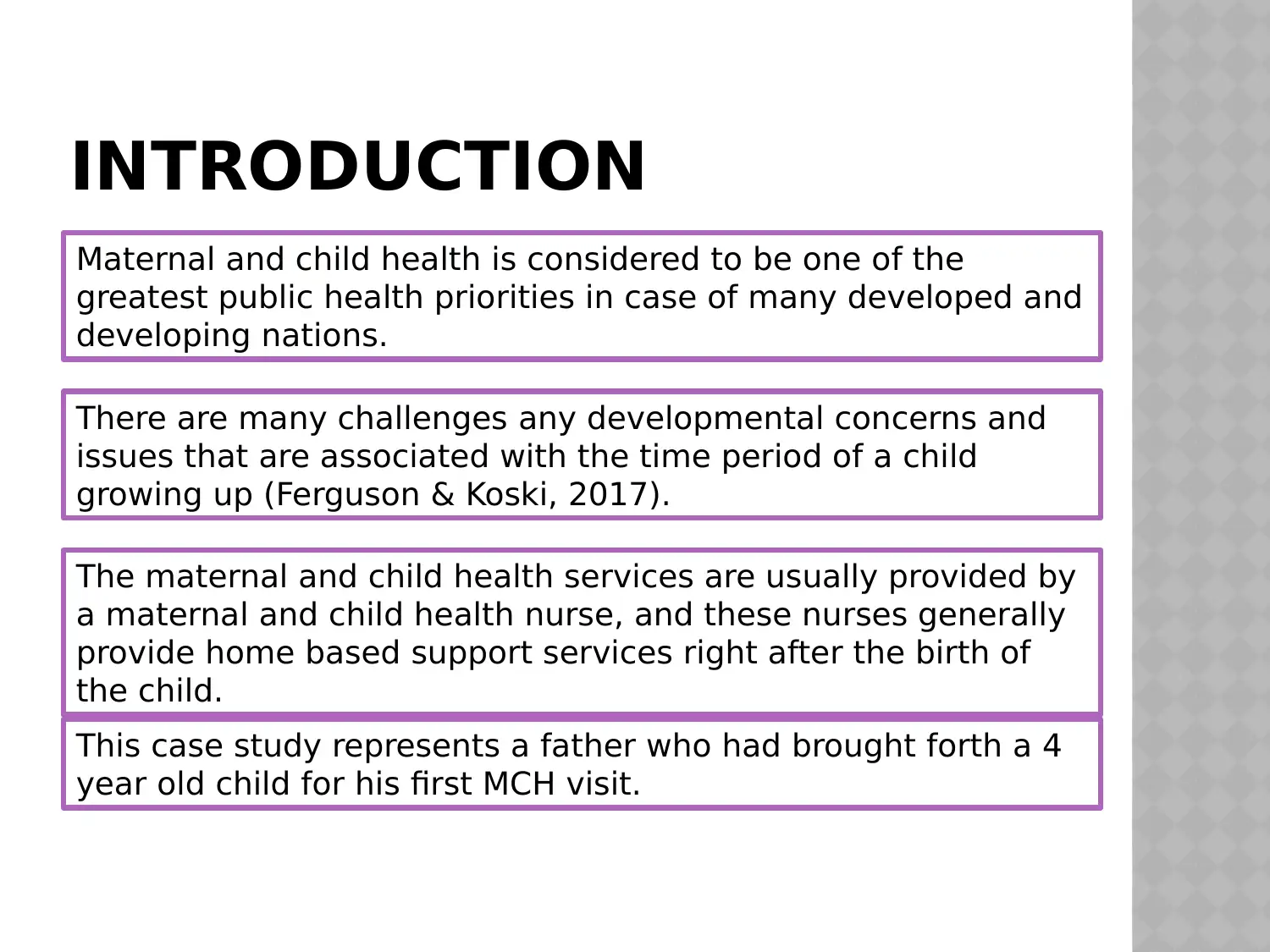
INTRODUCTION
Maternal and child health is considered to be one of the
greatest public health priorities in case of many developed and
developing nations.
There are many challenges any developmental concerns and
issues that are associated with the time period of a child
growing up (Ferguson & Koski, 2017).
The maternal and child health services are usually provided by
a maternal and child health nurse, and these nurses generally
provide home based support services right after the birth of
the child.
This case study represents a father who had brought forth a 4
year old child for his first MCH visit.
Maternal and child health is considered to be one of the
greatest public health priorities in case of many developed and
developing nations.
There are many challenges any developmental concerns and
issues that are associated with the time period of a child
growing up (Ferguson & Koski, 2017).
The maternal and child health services are usually provided by
a maternal and child health nurse, and these nurses generally
provide home based support services right after the birth of
the child.
This case study represents a father who had brought forth a 4
year old child for his first MCH visit.
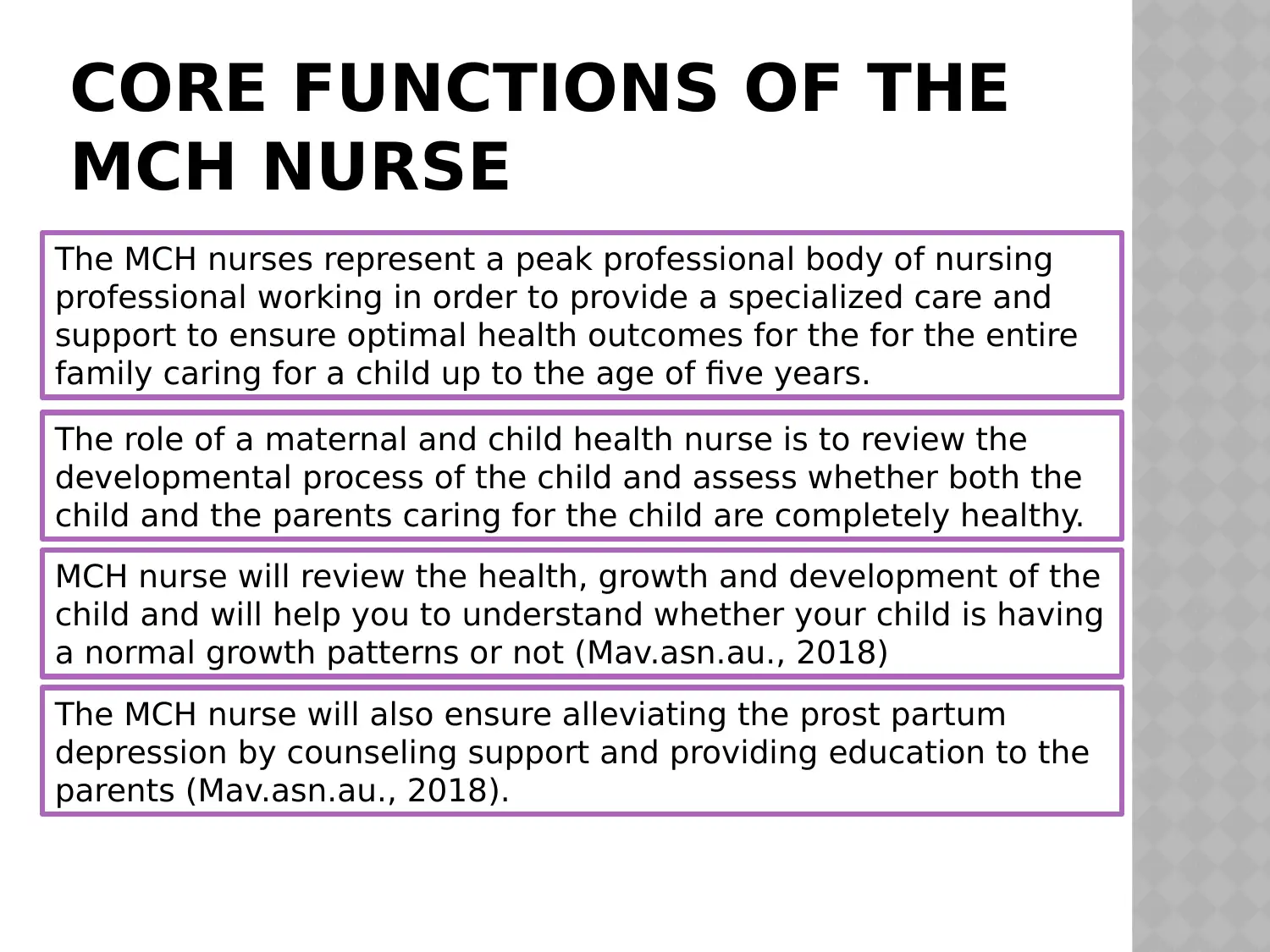
CORE FUNCTIONS OF THE
MCH NURSE
The MCH nurses represent a peak professional body of nursing
professional working in order to provide a specialized care and
support to ensure optimal health outcomes for the for the entire
family caring for a child up to the age of five years.
The role of a maternal and child health nurse is to review the
developmental process of the child and assess whether both the
child and the parents caring for the child are completely healthy.
MCH nurse will review the health, growth and development of the
child and will help you to understand whether your child is having
a normal growth patterns or not (Mav.asn.au., 2018)
The MCH nurse will also ensure alleviating the prost partum
depression by counseling support and providing education to the
parents (Mav.asn.au., 2018).
MCH NURSE
The MCH nurses represent a peak professional body of nursing
professional working in order to provide a specialized care and
support to ensure optimal health outcomes for the for the entire
family caring for a child up to the age of five years.
The role of a maternal and child health nurse is to review the
developmental process of the child and assess whether both the
child and the parents caring for the child are completely healthy.
MCH nurse will review the health, growth and development of the
child and will help you to understand whether your child is having
a normal growth patterns or not (Mav.asn.au., 2018)
The MCH nurse will also ensure alleviating the prost partum
depression by counseling support and providing education to the
parents (Mav.asn.au., 2018).
⊘ This is a preview!⊘
Do you want full access?
Subscribe today to unlock all pages.

Trusted by 1+ million students worldwide
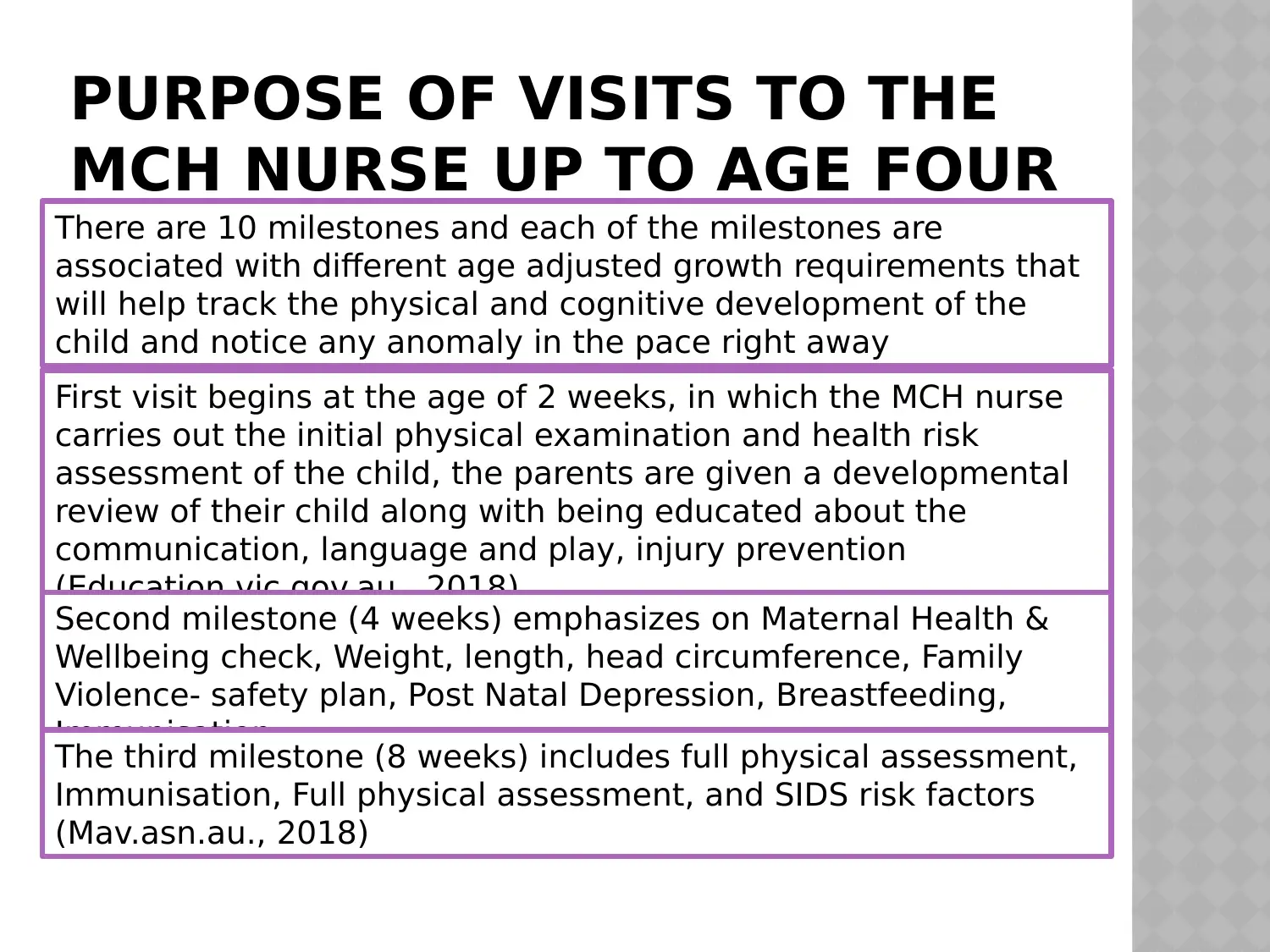
PURPOSE OF VISITS TO THE
MCH NURSE UP TO AGE FOUR
There are 10 milestones and each of the milestones are
associated with different age adjusted growth requirements that
will help track the physical and cognitive development of the
child and notice any anomaly in the pace right away
First visit begins at the age of 2 weeks, in which the MCH nurse
carries out the initial physical examination and health risk
assessment of the child, the parents are given a developmental
review of their child along with being educated about the
communication, language and play, injury prevention
(Education.vic.gov.au., 2018)
Second milestone (4 weeks) emphasizes on Maternal Health &
Wellbeing check, Weight, length, head circumference, Family
Violence- safety plan, Post Natal Depression, Breastfeeding,
Immunisation
The third milestone (8 weeks) includes full physical assessment,
Immunisation, Full physical assessment, and SIDS risk factors
(Mav.asn.au., 2018)
MCH NURSE UP TO AGE FOUR
There are 10 milestones and each of the milestones are
associated with different age adjusted growth requirements that
will help track the physical and cognitive development of the
child and notice any anomaly in the pace right away
First visit begins at the age of 2 weeks, in which the MCH nurse
carries out the initial physical examination and health risk
assessment of the child, the parents are given a developmental
review of their child along with being educated about the
communication, language and play, injury prevention
(Education.vic.gov.au., 2018)
Second milestone (4 weeks) emphasizes on Maternal Health &
Wellbeing check, Weight, length, head circumference, Family
Violence- safety plan, Post Natal Depression, Breastfeeding,
Immunisation
The third milestone (8 weeks) includes full physical assessment,
Immunisation, Full physical assessment, and SIDS risk factors
(Mav.asn.au., 2018)
Paraphrase This Document
Need a fresh take? Get an instant paraphrase of this document with our AI Paraphraser
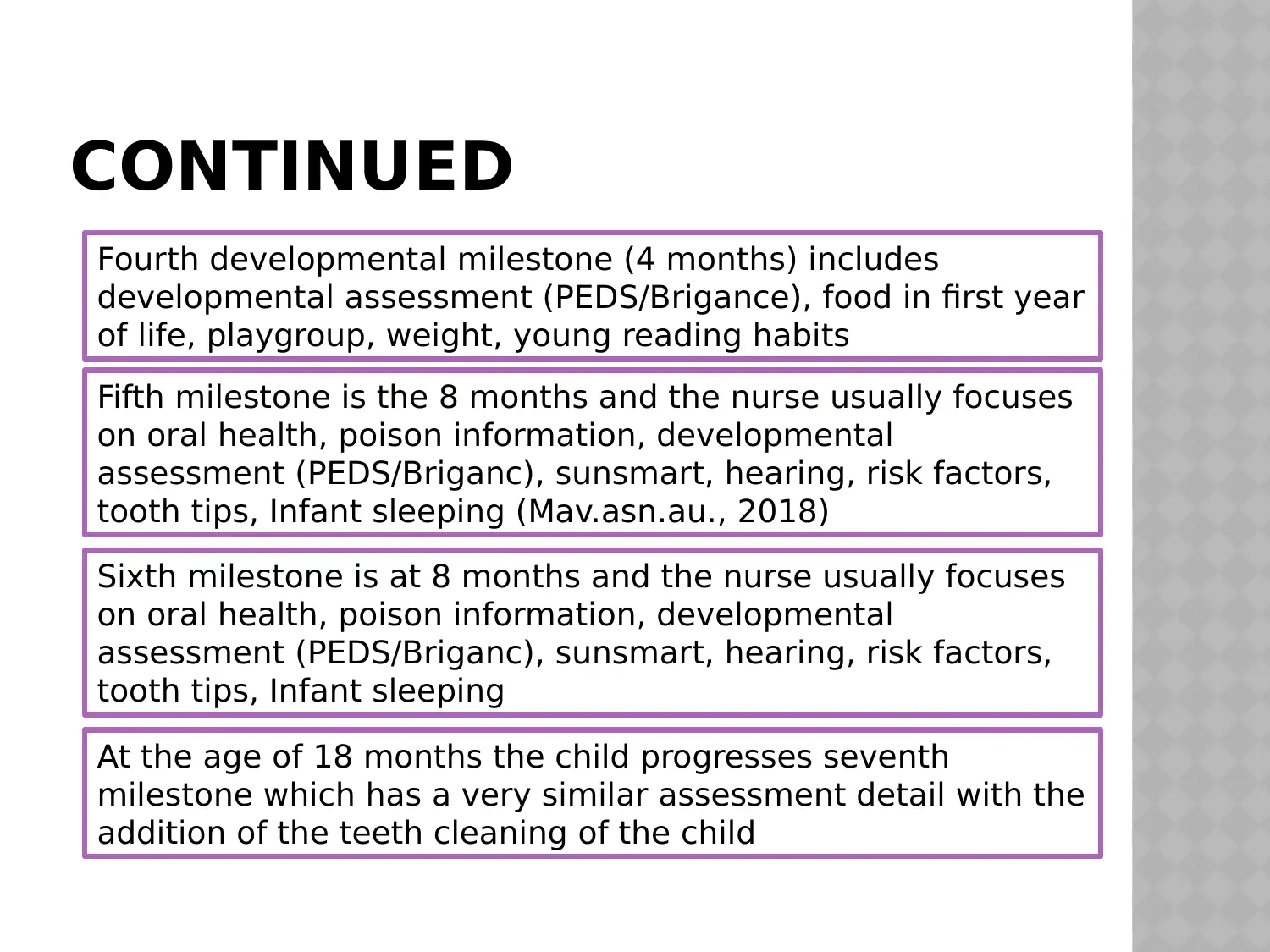
CONTINUED
Fourth developmental milestone (4 months) includes
developmental assessment (PEDS/Brigance), food in first year
of life, playgroup, weight, young reading habits
Fifth milestone is the 8 months and the nurse usually focuses
on oral health, poison information, developmental
assessment (PEDS/Briganc), sunsmart, hearing, risk factors,
tooth tips, Infant sleeping (Mav.asn.au., 2018)
Sixth milestone is at 8 months and the nurse usually focuses
on oral health, poison information, developmental
assessment (PEDS/Briganc), sunsmart, hearing, risk factors,
tooth tips, Infant sleeping
At the age of 18 months the child progresses seventh
milestone which has a very similar assessment detail with the
addition of the teeth cleaning of the child
Fourth developmental milestone (4 months) includes
developmental assessment (PEDS/Brigance), food in first year
of life, playgroup, weight, young reading habits
Fifth milestone is the 8 months and the nurse usually focuses
on oral health, poison information, developmental
assessment (PEDS/Briganc), sunsmart, hearing, risk factors,
tooth tips, Infant sleeping (Mav.asn.au., 2018)
Sixth milestone is at 8 months and the nurse usually focuses
on oral health, poison information, developmental
assessment (PEDS/Briganc), sunsmart, hearing, risk factors,
tooth tips, Infant sleeping
At the age of 18 months the child progresses seventh
milestone which has a very similar assessment detail with the
addition of the teeth cleaning of the child
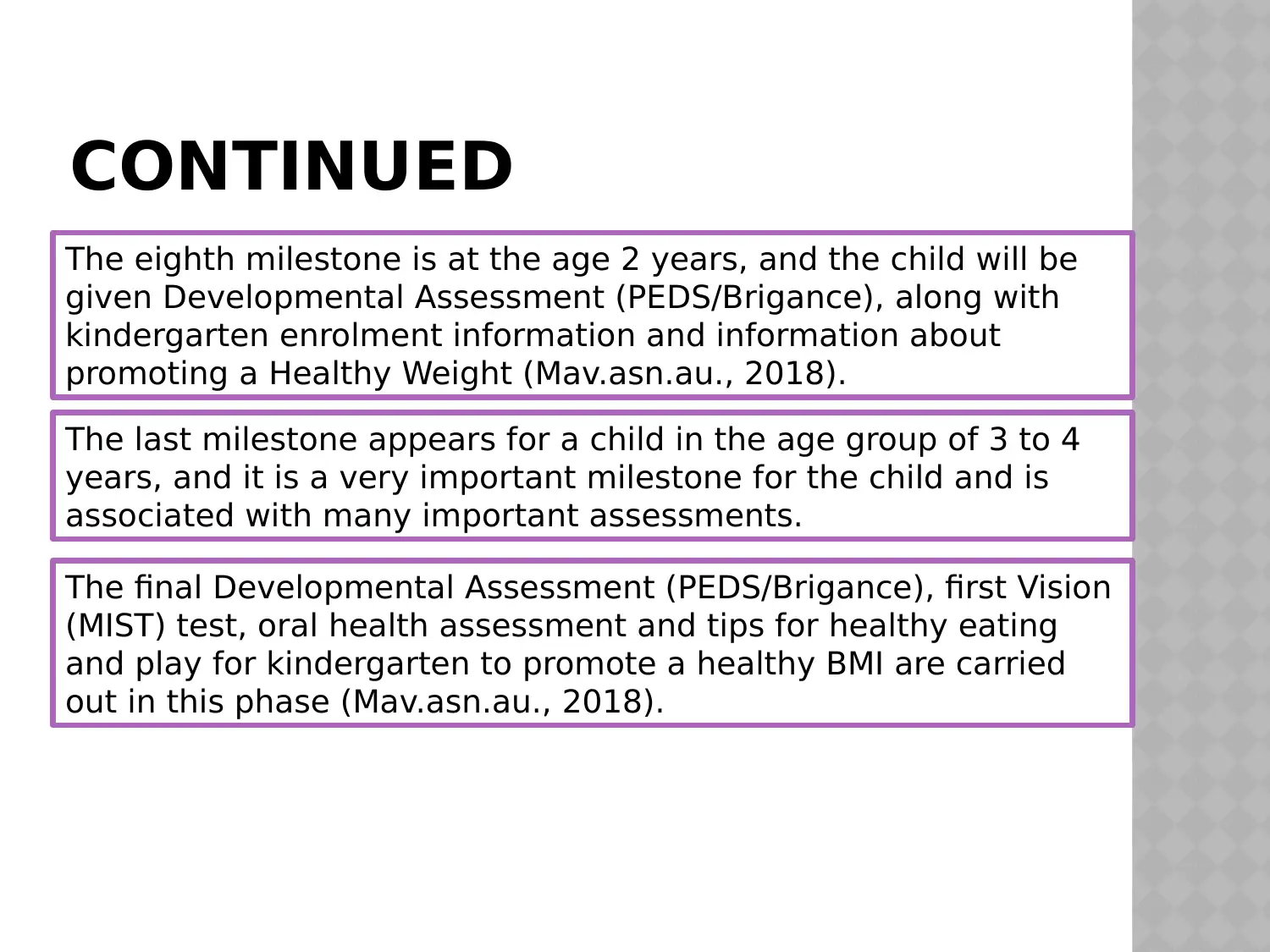
CONTINUED
The eighth milestone is at the age 2 years, and the child will be
given Developmental Assessment (PEDS/Brigance), along with
kindergarten enrolment information and information about
promoting a Healthy Weight (Mav.asn.au., 2018).
The last milestone appears for a child in the age group of 3 to 4
years, and it is a very important milestone for the child and is
associated with many important assessments.
The final Developmental Assessment (PEDS/Brigance), first Vision
(MIST) test, oral health assessment and tips for healthy eating
and play for kindergarten to promote a healthy BMI are carried
out in this phase (Mav.asn.au., 2018).
The eighth milestone is at the age 2 years, and the child will be
given Developmental Assessment (PEDS/Brigance), along with
kindergarten enrolment information and information about
promoting a Healthy Weight (Mav.asn.au., 2018).
The last milestone appears for a child in the age group of 3 to 4
years, and it is a very important milestone for the child and is
associated with many important assessments.
The final Developmental Assessment (PEDS/Brigance), first Vision
(MIST) test, oral health assessment and tips for healthy eating
and play for kindergarten to promote a healthy BMI are carried
out in this phase (Mav.asn.au., 2018).
⊘ This is a preview!⊘
Do you want full access?
Subscribe today to unlock all pages.

Trusted by 1+ million students worldwide
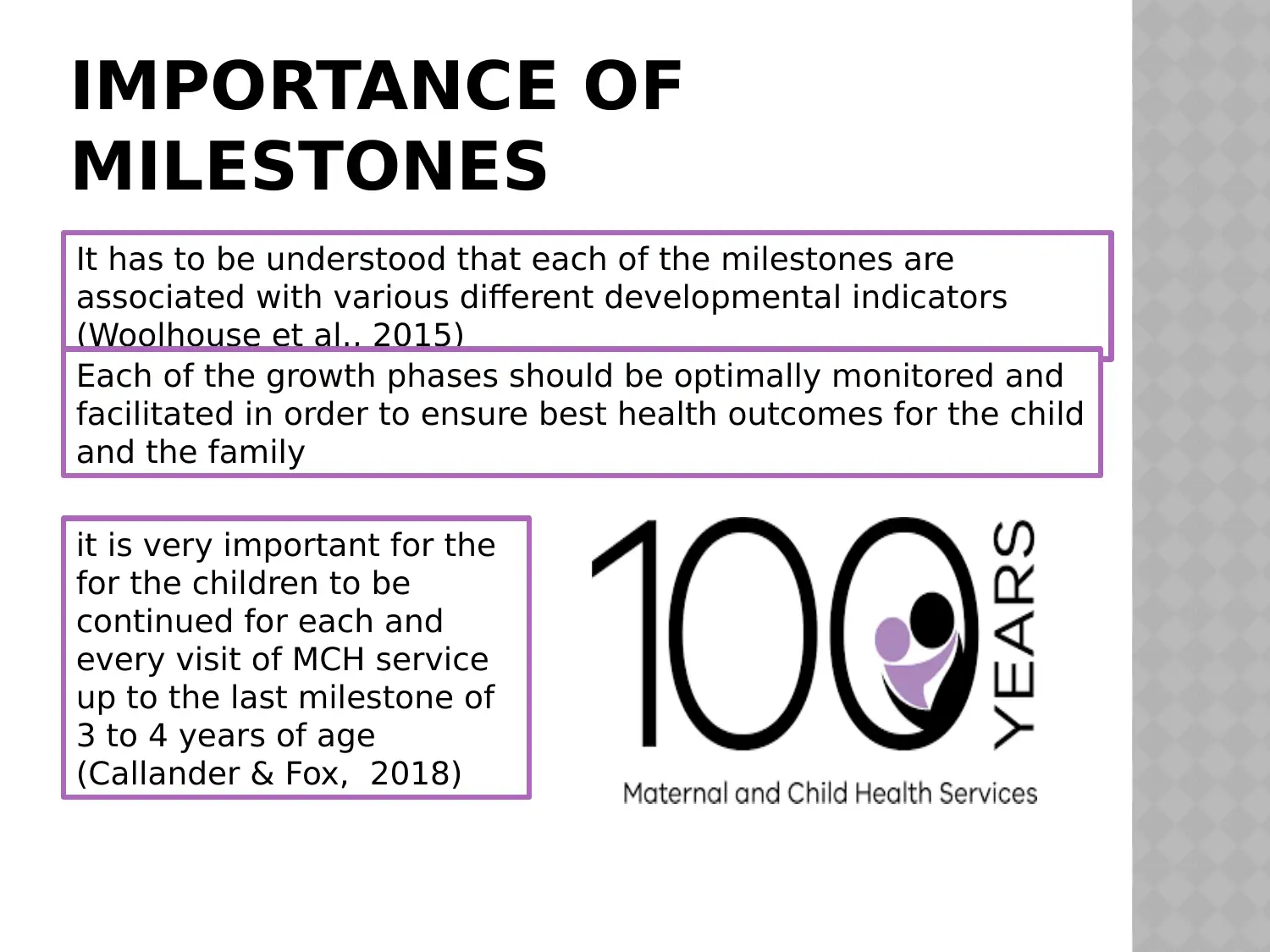
IMPORTANCE OF
MILESTONES
It has to be understood that each of the milestones are
associated with various different developmental indicators
(Woolhouse et al., 2015)
Each of the growth phases should be optimally monitored and
facilitated in order to ensure best health outcomes for the child
and the family
it is very important for the
for the children to be
continued for each and
every visit of MCH service
up to the last milestone of
3 to 4 years of age
(Callander & Fox, 2018)
MILESTONES
It has to be understood that each of the milestones are
associated with various different developmental indicators
(Woolhouse et al., 2015)
Each of the growth phases should be optimally monitored and
facilitated in order to ensure best health outcomes for the child
and the family
it is very important for the
for the children to be
continued for each and
every visit of MCH service
up to the last milestone of
3 to 4 years of age
(Callander & Fox, 2018)
Paraphrase This Document
Need a fresh take? Get an instant paraphrase of this document with our AI Paraphraser
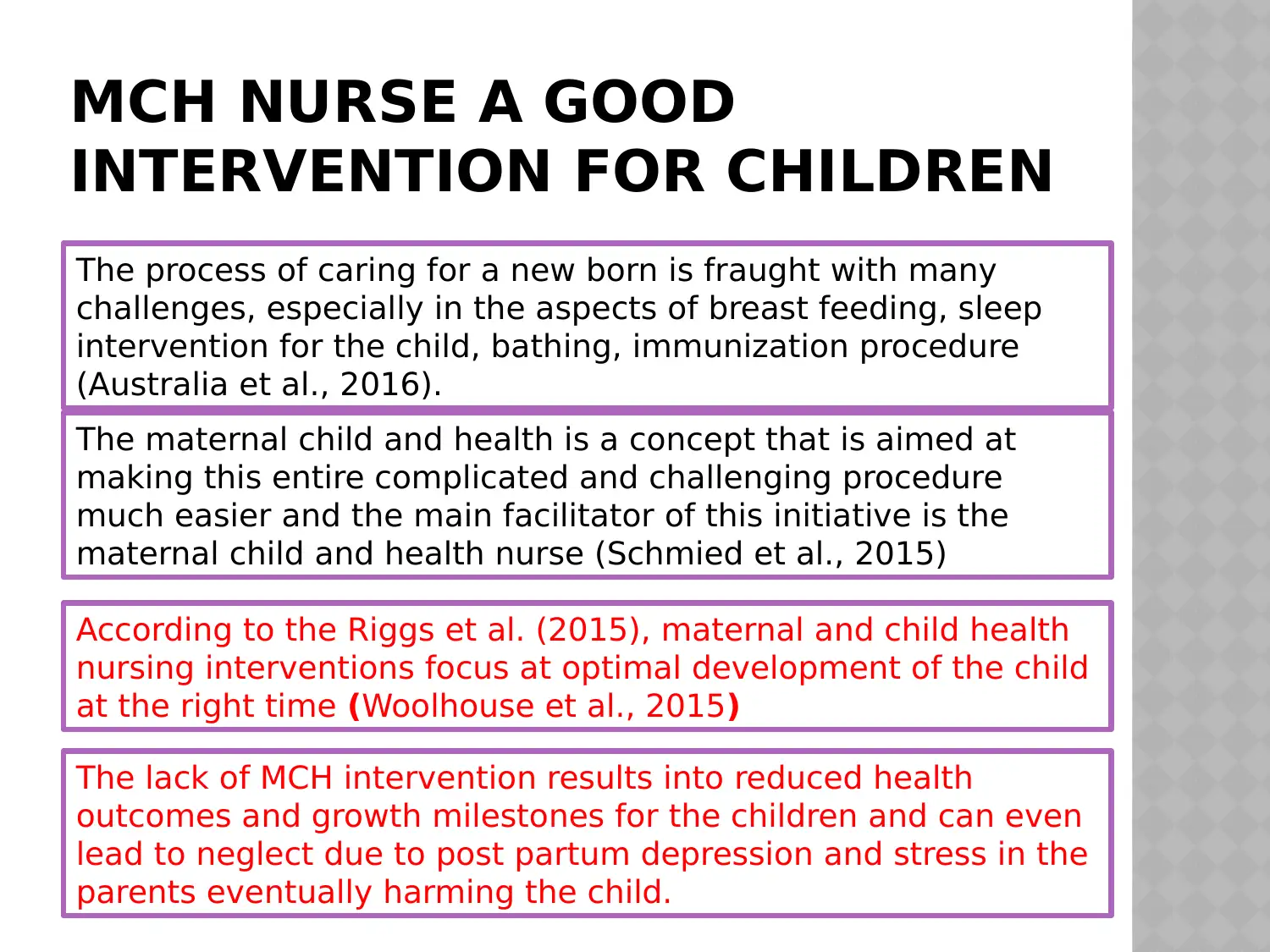
MCH NURSE A GOOD
INTERVENTION FOR CHILDREN
The process of caring for a new born is fraught with many
challenges, especially in the aspects of breast feeding, sleep
intervention for the child, bathing, immunization procedure
(Australia et al., 2016).
The maternal child and health is a concept that is aimed at
making this entire complicated and challenging procedure
much easier and the main facilitator of this initiative is the
maternal child and health nurse (Schmied et al., 2015)
According to the Riggs et al. (2015), maternal and child health
nursing interventions focus at optimal development of the child
at the right time (Woolhouse et al., 2015)
The lack of MCH intervention results into reduced health
outcomes and growth milestones for the children and can even
lead to neglect due to post partum depression and stress in the
parents eventually harming the child.
INTERVENTION FOR CHILDREN
The process of caring for a new born is fraught with many
challenges, especially in the aspects of breast feeding, sleep
intervention for the child, bathing, immunization procedure
(Australia et al., 2016).
The maternal child and health is a concept that is aimed at
making this entire complicated and challenging procedure
much easier and the main facilitator of this initiative is the
maternal child and health nurse (Schmied et al., 2015)
According to the Riggs et al. (2015), maternal and child health
nursing interventions focus at optimal development of the child
at the right time (Woolhouse et al., 2015)
The lack of MCH intervention results into reduced health
outcomes and growth milestones for the children and can even
lead to neglect due to post partum depression and stress in the
parents eventually harming the child.
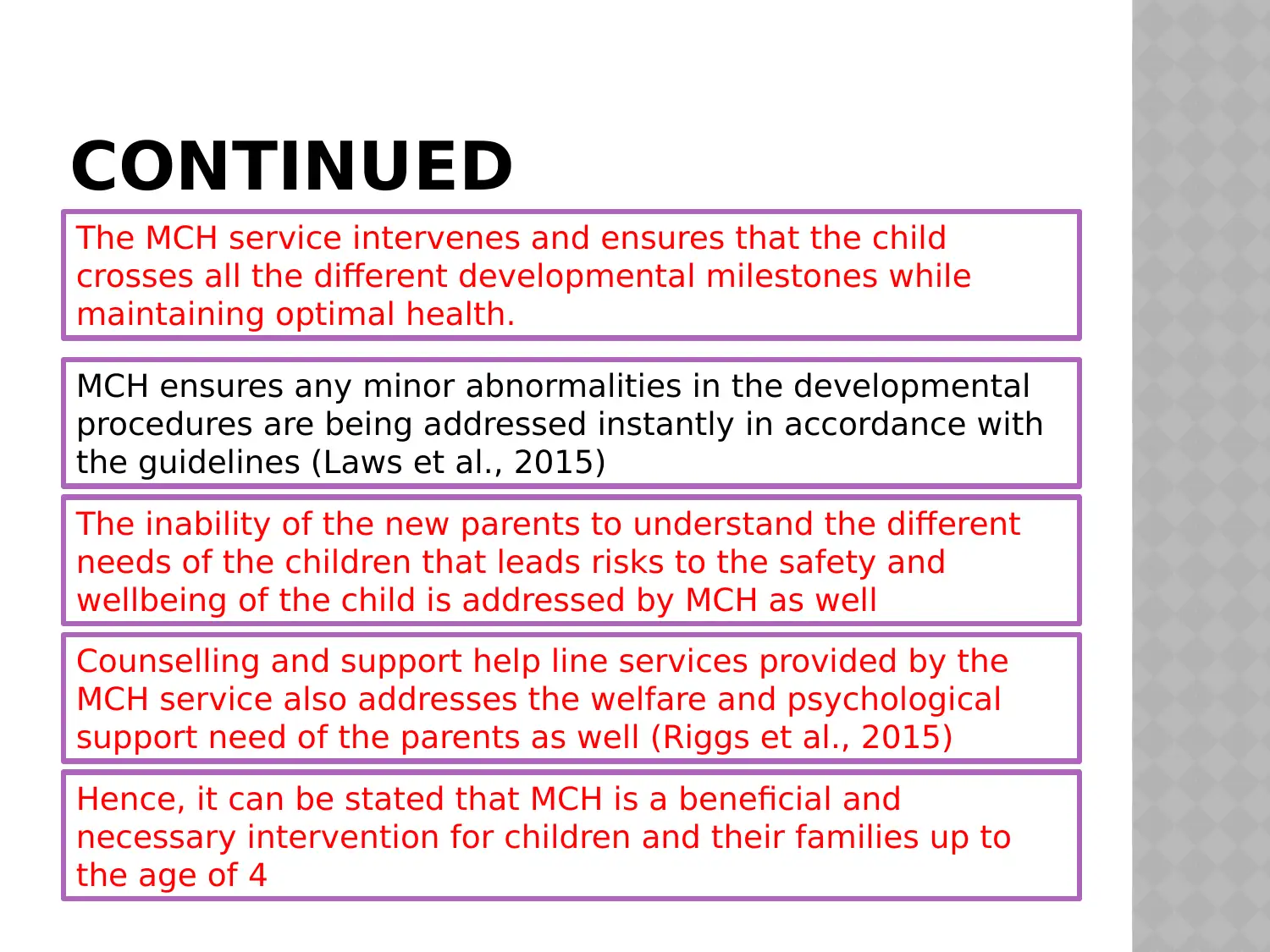
CONTINUED
The MCH service intervenes and ensures that the child
crosses all the different developmental milestones while
maintaining optimal health.
MCH ensures any minor abnormalities in the developmental
procedures are being addressed instantly in accordance with
the guidelines (Laws et al., 2015)
The inability of the new parents to understand the different
needs of the children that leads risks to the safety and
wellbeing of the child is addressed by MCH as well
Counselling and support help line services provided by the
MCH service also addresses the welfare and psychological
support need of the parents as well (Riggs et al., 2015)
Hence, it can be stated that MCH is a beneficial and
necessary intervention for children and their families up to
the age of 4
The MCH service intervenes and ensures that the child
crosses all the different developmental milestones while
maintaining optimal health.
MCH ensures any minor abnormalities in the developmental
procedures are being addressed instantly in accordance with
the guidelines (Laws et al., 2015)
The inability of the new parents to understand the different
needs of the children that leads risks to the safety and
wellbeing of the child is addressed by MCH as well
Counselling and support help line services provided by the
MCH service also addresses the welfare and psychological
support need of the parents as well (Riggs et al., 2015)
Hence, it can be stated that MCH is a beneficial and
necessary intervention for children and their families up to
the age of 4
⊘ This is a preview!⊘
Do you want full access?
Subscribe today to unlock all pages.

Trusted by 1+ million students worldwide
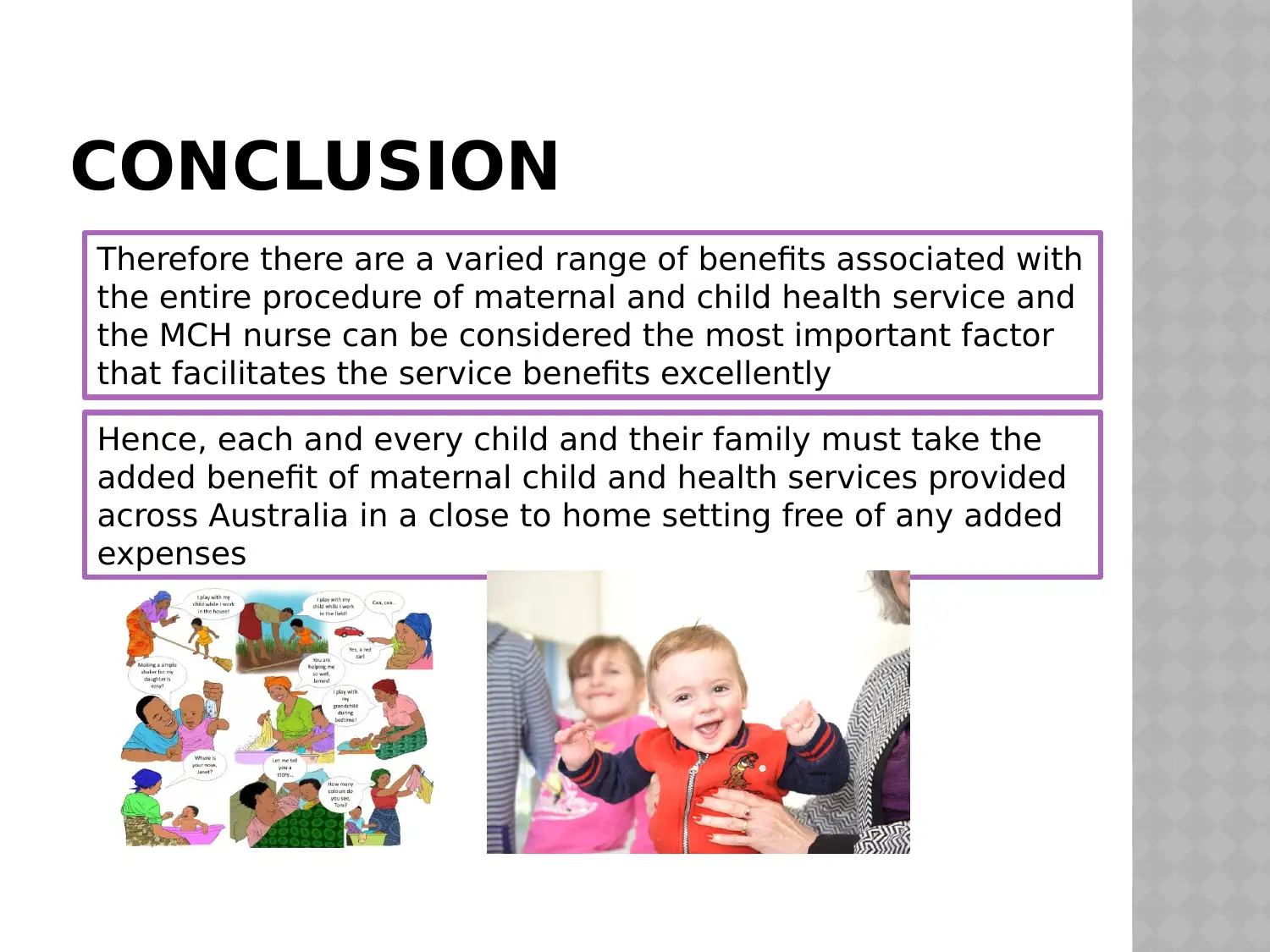
CONCLUSION
Therefore there are a varied range of benefits associated with
the entire procedure of maternal and child health service and
the MCH nurse can be considered the most important factor
that facilitates the service benefits excellently
Hence, each and every child and their family must take the
added benefit of maternal child and health services provided
across Australia in a close to home setting free of any added
expenses
Therefore there are a varied range of benefits associated with
the entire procedure of maternal and child health service and
the MCH nurse can be considered the most important factor
that facilitates the service benefits excellently
Hence, each and every child and their family must take the
added benefit of maternal child and health services provided
across Australia in a close to home setting free of any added
expenses
Paraphrase This Document
Need a fresh take? Get an instant paraphrase of this document with our AI Paraphraser
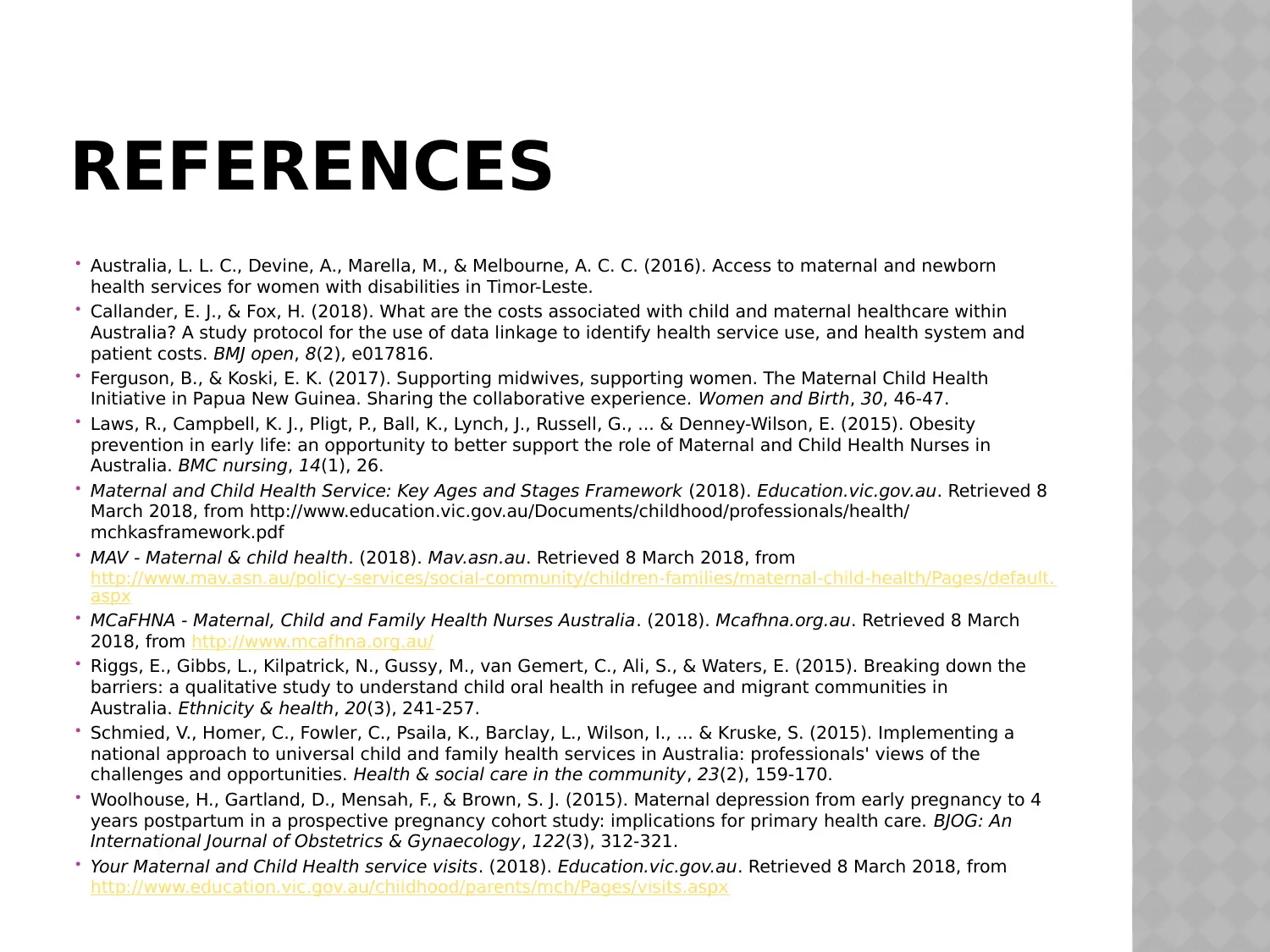
REFERENCES
Australia, L. L. C., Devine, A., Marella, M., & Melbourne, A. C. C. (2016). Access to maternal and newborn
health services for women with disabilities in Timor-Leste.
Callander, E. J., & Fox, H. (2018). What are the costs associated with child and maternal healthcare within
Australia? A study protocol for the use of data linkage to identify health service use, and health system and
patient costs. BMJ open, 8(2), e017816.
Ferguson, B., & Koski, E. K. (2017). Supporting midwives, supporting women. The Maternal Child Health
Initiative in Papua New Guinea. Sharing the collaborative experience. Women and Birth, 30, 46-47.
Laws, R., Campbell, K. J., Pligt, P., Ball, K., Lynch, J., Russell, G., ... & Denney-Wilson, E. (2015). Obesity
prevention in early life: an opportunity to better support the role of Maternal and Child Health Nurses in
Australia. BMC nursing, 14(1), 26.
Maternal and Child Health Service: Key Ages and Stages Framework (2018). Education.vic.gov.au. Retrieved 8
March 2018, from http://www.education.vic.gov.au/Documents/childhood/professionals/health/
mchkasframework.pdf
MAV - Maternal & child health. (2018). Mav.asn.au. Retrieved 8 March 2018, from
http://www.mav.asn.au/policy-services/social-community/children-families/maternal-child-health/Pages/default.
aspx
MCaFHNA - Maternal, Child and Family Health Nurses Australia. (2018). Mcafhna.org.au. Retrieved 8 March
2018, from http://www.mcafhna.org.au/
Riggs, E., Gibbs, L., Kilpatrick, N., Gussy, M., van Gemert, C., Ali, S., & Waters, E. (2015). Breaking down the
barriers: a qualitative study to understand child oral health in refugee and migrant communities in
Australia. Ethnicity & health, 20(3), 241-257.
Schmied, V., Homer, C., Fowler, C., Psaila, K., Barclay, L., Wilson, I., ... & Kruske, S. (2015). Implementing a
national approach to universal child and family health services in Australia: professionals' views of the
challenges and opportunities. Health & social care in the community, 23(2), 159-170.
Woolhouse, H., Gartland, D., Mensah, F., & Brown, S. J. (2015). Maternal depression from early pregnancy to 4
years postpartum in a prospective pregnancy cohort study: implications for primary health care. BJOG: An
International Journal of Obstetrics & Gynaecology, 122(3), 312-321.
Your Maternal and Child Health service visits. (2018). Education.vic.gov.au. Retrieved 8 March 2018, from
http://www.education.vic.gov.au/childhood/parents/mch/Pages/visits.aspx
Australia, L. L. C., Devine, A., Marella, M., & Melbourne, A. C. C. (2016). Access to maternal and newborn
health services for women with disabilities in Timor-Leste.
Callander, E. J., & Fox, H. (2018). What are the costs associated with child and maternal healthcare within
Australia? A study protocol for the use of data linkage to identify health service use, and health system and
patient costs. BMJ open, 8(2), e017816.
Ferguson, B., & Koski, E. K. (2017). Supporting midwives, supporting women. The Maternal Child Health
Initiative in Papua New Guinea. Sharing the collaborative experience. Women and Birth, 30, 46-47.
Laws, R., Campbell, K. J., Pligt, P., Ball, K., Lynch, J., Russell, G., ... & Denney-Wilson, E. (2015). Obesity
prevention in early life: an opportunity to better support the role of Maternal and Child Health Nurses in
Australia. BMC nursing, 14(1), 26.
Maternal and Child Health Service: Key Ages and Stages Framework (2018). Education.vic.gov.au. Retrieved 8
March 2018, from http://www.education.vic.gov.au/Documents/childhood/professionals/health/
mchkasframework.pdf
MAV - Maternal & child health. (2018). Mav.asn.au. Retrieved 8 March 2018, from
http://www.mav.asn.au/policy-services/social-community/children-families/maternal-child-health/Pages/default.
aspx
MCaFHNA - Maternal, Child and Family Health Nurses Australia. (2018). Mcafhna.org.au. Retrieved 8 March
2018, from http://www.mcafhna.org.au/
Riggs, E., Gibbs, L., Kilpatrick, N., Gussy, M., van Gemert, C., Ali, S., & Waters, E. (2015). Breaking down the
barriers: a qualitative study to understand child oral health in refugee and migrant communities in
Australia. Ethnicity & health, 20(3), 241-257.
Schmied, V., Homer, C., Fowler, C., Psaila, K., Barclay, L., Wilson, I., ... & Kruske, S. (2015). Implementing a
national approach to universal child and family health services in Australia: professionals' views of the
challenges and opportunities. Health & social care in the community, 23(2), 159-170.
Woolhouse, H., Gartland, D., Mensah, F., & Brown, S. J. (2015). Maternal depression from early pregnancy to 4
years postpartum in a prospective pregnancy cohort study: implications for primary health care. BJOG: An
International Journal of Obstetrics & Gynaecology, 122(3), 312-321.
Your Maternal and Child Health service visits. (2018). Education.vic.gov.au. Retrieved 8 March 2018, from
http://www.education.vic.gov.au/childhood/parents/mch/Pages/visits.aspx

⊘ This is a preview!⊘
Do you want full access?
Subscribe today to unlock all pages.

Trusted by 1+ million students worldwide
1 out of 12
Your All-in-One AI-Powered Toolkit for Academic Success.
+13062052269
info@desklib.com
Available 24*7 on WhatsApp / Email
![[object Object]](/_next/static/media/star-bottom.7253800d.svg)
Unlock your academic potential
Copyright © 2020–2026 A2Z Services. All Rights Reserved. Developed and managed by ZUCOL.


